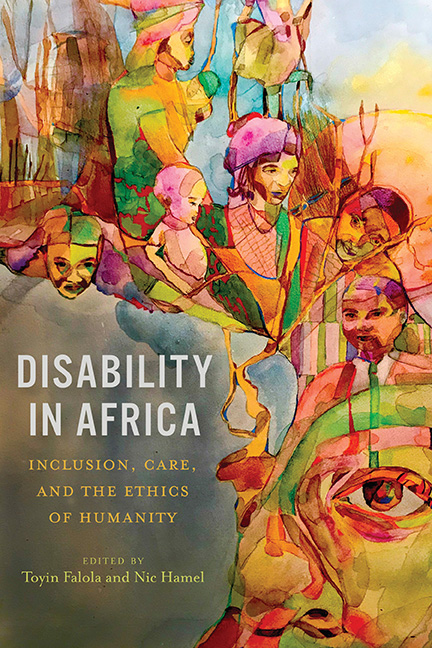Book contents
- Frontmatter
- Dedication
- Contents
- Part One Introducing the Field
- Part Two Theorizing Disability in Africa
- Part Three Representation and Cultural Expressions
- Part Four Education, Community, and Caregiving
- Part Five Activism and Barriers to Inclusion
- Conclusion: A Research Agenda for African Disability Studies
- Selected Bibliography
- Notes on Contributors
- Index
7 - Disfiguration, Trauma, and Disability: Reclaiming the Body and the Case against Prosthetics
Published online by Cambridge University Press: 17 June 2021
- Frontmatter
- Dedication
- Contents
- Part One Introducing the Field
- Part Two Theorizing Disability in Africa
- Part Three Representation and Cultural Expressions
- Part Four Education, Community, and Caregiving
- Part Five Activism and Barriers to Inclusion
- Conclusion: A Research Agenda for African Disability Studies
- Selected Bibliography
- Notes on Contributors
- Index
Summary
Introduction
The disfigured body tells a story. It is a horrific story of mutilation and amputation that creates a sense of dependency and dysfunction. It also tells a story of adjustment and overcoming of obstacles that articulates a sense of agency. The power of the disfigured body lies not in either story that it tells but in its complex ability to tell both stories at the same time. The uniqueness of the disfigured body lies not in its limitations but rather in what it potentially can achieve in spite of them.
Sorious Samura's documentary, Cry Freetown, provided the original impetus for this chapter and was eventually the catalyst for my work on trauma and disability studies. As an amateur photojournalist, Samura documented the brutal carnage that characterized the January 6, 1999, invasion of Freetown by the RUF rebels and the resulting battle with Nigerian peacekeepers for control of the city. While seeking refuge in the Gambia, I watched the CNN broadcast of Cry Freetown, hosted by veteran CNN anchor Jim Clancy through GRTS (Gambia Radio and Television Services).
I must also state that this chapter is a continuation of my earlier work. While I draw from my monograph to make critical claims on the ambivalence of the disfigured body, I also incorporate new findings from my ongoing research on body studies and semiosis, prosthetics and clinical therapy, and trauma and resilience. In addition, I explored my findings on the connections between body and body politic as a way of understanding violence and trauma within the political and social constructs of postwar Sierra Leone. This chapter, then, is a component of the larger significance of my work: to investigate the choice of the body as medium of punishment, put forward as a set of critical formations regarding that choice, and to theorize about the meanings of the mutilated body during and after the civil war. This chapter investigates the connections between injury and identity and how injury can be used to deconstruct hegemony and domination through the creation of a culture of disability that seeks to transform cultural perceptions of disability rather than disabled people.
- Type
- Chapter
- Information
- Disability in AfricaInclusion, Care, and the Ethics of Humanity, pp. 161 - 184Publisher: Boydell & BrewerPrint publication year: 2021



